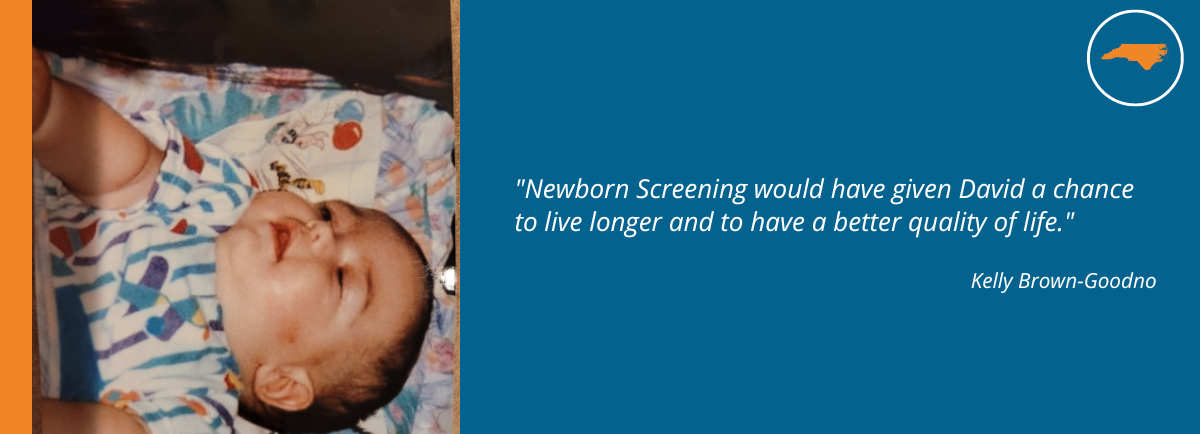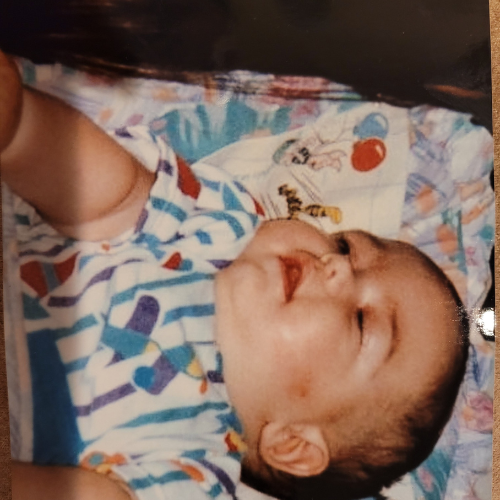DOWNLOAD STATE FACT SHEET AS PDF

In 2020, there were 116,730 live births in North Carolina2 There are 41 conditions on the North Carolina Newborn Screening Panel3
All babies in the United States are screened for several conditions shortly after birth. Approximately 24-48 hours after a baby is born in the United States, the heel is pricked by a nurse to collect a small blood sample. Afterward, the nurse puts a series of blood drops onto a filter paper to create several “dried blood spots.” Next, the newborn screening card is sent to the state laboratory for analysis. North Carolina is not screening for Krabbe Disease.
What is Krabbe Disease?
Krabbe disease (pronounced krab A), is a rare genetic disorder, also known as globoid cell leukodystrophy. In the United States, Krabbe disease has been reported to affect approximately 1 in 100,000 individuals. Infantile Krabbe disease is the most common and severe form causing infants to lose the ability to eat, extreme irritability, inability to sit up, grasp objects, blindness, and seizures. Sadly, infants die within the first 2-3 years of life in states that do not test for Krabbe disease. We invite you to learn more about Understanding Krabbe Disease.
Why Screen for Krabbe Disease?
Krabbe disease is a severe neurodegenerative and rapidly progressing condition requiring immediate treatment for the most severe forms. The medical issues and symptoms of Krabbe disease are very significant and life-impacting. A delayed diagnosis, especially in the most severe forms, equates to palliative and supportive care as the only means of treatment until premature death.
Krabbe Disease Hero: David Aaron

See all our Krabbe Disease Heroes.
Kelly was overjoyed to welcome her son, David, into her life and dreamed of what the future would hold for him. She noticed that he was spitting up frequently and her intuition told her that this was not the typical spitting up that babies do.
Kelly spent six months trying to get doctors to listen; after seeing a pediatrician, gastroenterologists, and neurologists – and after many hospital stays and blood draws – David was diagnosed with Krabbe Disease around six months of age. The news was delivered by phone while Kelly was at work. The only thing she remembers hearing was that he would not live beyond the age of two – she was devastated and the rest of the information was a blur.
In disbelief at what she just heard, Kelly called David’s pediatrician; without hesitation, she told Kelly to come to her office as soon as possible despite the fact that it was after normal office hours. By the time Kelly arrived, the pediatrician had learned as much as she could about Krabbe Disease and spent several hours with Kelly, answering as many questions as she could. This was a wonderful blessing.
David loved listening to stories Kelly would read to him and he loved music. He loved to stand in his stander and go for walks outside. David adored his older brother and sister as they played with him, held him, and helped in any way they could at their young ages. You could see the love in his eyes as he watched and interacted with them.
David passed away when he was fifteen and a half months old. Newborn Screening for Krabbe Disease would have given David a chance to live longer, with less pain and a much better quality of life. That’s why Kelly advocates for it to be added in North Carolina and the rest of the country.
Resources
- The Leukodystrophy Newborn Screening Action Network is dedicated to advancing newborn screening for leukodystrophies and lysosomal storage disorders, supporting newly-diagnosed families, and ensuring collaboration between all stakeholders. Learn more at https://ldnbs.org/.
- CDC offers funding and assistance through the Newborn Screening Quality Assurance Program (NSQAP). More information can be found at https://www.cdc.gov/labstandards/nsqap.html.
- Baby’s First Test provides funding opportunities through grants. Learn more at https://www.babysfirsttest.org/newborn-screening/funding-opportunities.
- American Public Health Laboratories NewSTEPS program provides data, technical assistance, and training. Details at https://www.newsteps.org/.
- KrabbeConnect offers patient support services to help families navigate the burden of Krabbe disease. Learn more at https://krabbeconnect.org/.
- Hunter’s Hope Foundation is a non-profit organization committed to giving hope through education, awareness, research, and family care for all leukodystrophies. Learn more at https://www.huntershope.org/.
Citations
- Wenger DA. Krabbe Disease. 2000 Jun 19 [Updated 2011 Mar 31]. In: Pagon RA, Adam MP, Ardinger HH, et al., editors. GeneReviews® [Internet]. Seattle (WA): University of Washington, Seattle; 1993-2017.
- “Fertility Rate: North Carolina, 2010-2020.” March of Dimes | PeriStats, https://www.marchofdimes.org/peristats/data?reg=99&top=2&stop=1&lev=1&slev=4&obj=1&sreg=34. Accessed 13 August 2023.
- “North Carolina| Baby’s First Test | Newborn Screening | Baby Health.” Babysfirsttest.org, 2015, https://www.babysfirsttest.org/newborn-screening/states/North Carolina. Accessed 13 August 2023.
All information in this fact sheet is based on data available before August 13, 2023.


